This article is the second in a series that will analyze Gallup's latest March update on Americans' views on climate change and examine how these views have changed over time. The series will explore public opinion on the severity and importance of climate change, its causes and effects, the extent of Americans' understanding of the issue, and much more.
PRINCETON, NJ -- The majority of Americans continue to believe that the effects of global warming are happening or will begin to happen during their lifetimes. At the same time, many fewer, currently 36%, believe global warming will pose a serious threat to their way of life during their lifetimes.
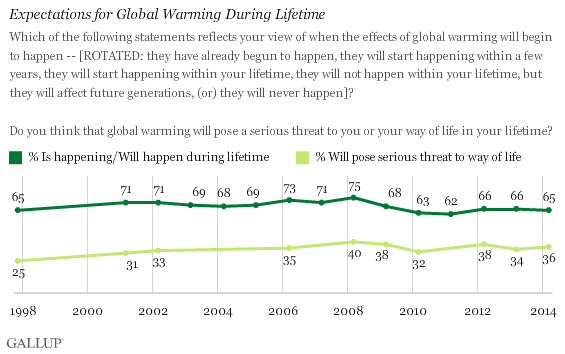
The results are based on Gallup's annual Environment poll, conducted March 6-9. Only about half of those who expect global warming to occur during their lifetimes, 51%, believe it will pose a serious threat to their way of life. This explains the gap between Americans' perceptions that global warming is occurring and that it will be a threat.
Although the gap between the perceived occurrence and perceived threat of global warming remains wide, it is narrower than in the past. The percentage of Americans who believe global warming's effects will happen during their lifetimes is the same now as it was in 1997, when Gallup first asked the question, and is among the lower readings over that 17-year span. During that same period, the percentage who believe global warming will threaten their way of life has increased from 25% to 36%.
Gallup's 2008 survey marked the peak in the belief that global warming will happen during one's lifetime (75%) and that it will seriously threaten one's way of life (40%).
Currently, 54% of Americans say the effects of global warming have already begun to happen, with 3% saying they will begin in a few years and 8% saying they will happen during their lifetimes. Another 16% expect that global warming's effects will not start in their own lifetimes but will affect future generations. This leaves 18% saying the effects will never happen, double the 9% who said this in 1997.
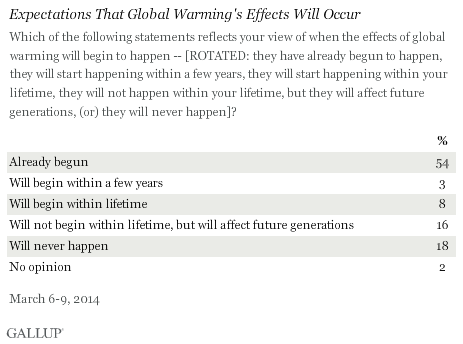
Older Americans Less Likely to See Global Warming as Threat
Americans younger than 65 are much more likely than senior citizens to believe global warming will seriously threaten their way of life. Whereas 18% of seniors say global warming will be a threat to the way they live, roughly four in 10 of those in younger age groups do.
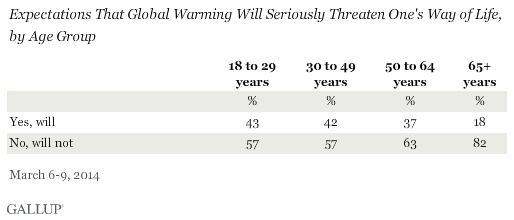
That difference could be due to practical considerations; senior citizens can rightly expect that they have fewer years left on earth than younger Americans, and therefore to believe that long-term issues such as global warming will not affect them personally. Senior citizens are also the age group least likely to believe that global warming will happen during their lifetimes. However, these differences are not entirely a function of seniors' recognition of their advanced age, as those 65 and older are also most skeptical that the effects of global warming have already begun.
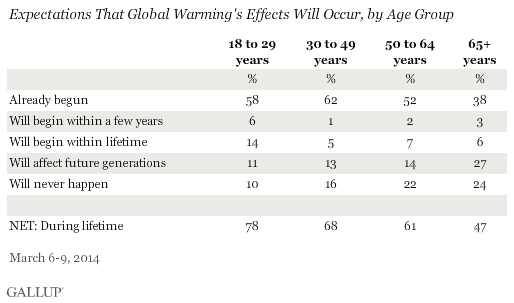
Notably, although young Americans are the most likely age group to believe that the effects of global warming will occur during their lifetimes, they are no more likely than 30- to 49-year-olds, and just slightly more likely than 50- to 64-year-olds, to believe global warming will seriously threaten their way of life.
Seniors' greater skepticism about global warming may be influenced by their Republican-leaning politics; party identification is a major factor in Americans' views of global warming. Democrats are nearly twice as likely as Republicans to believe the effects of global warming will occur in their lifetimes, and nearly three times as likely to believe it will seriously threaten their way of life.
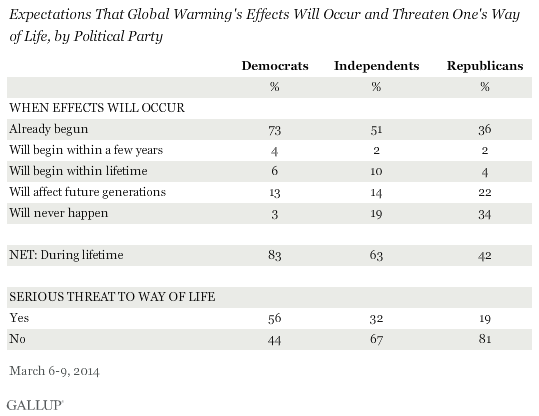
Implications
Most Americans believe global warming's effects will occur during their lifetimes, though this sentiment is no higher than it was 17 years ago, and is down from a peak of 75% in 2008. At the same time, although Americans largely do not view global warming as a likely threat to their way of life, they are more likely to believe this now than in the 1990s.
Americans' belief that global warming is not a serious threat to their way of life may help explain why they see it and the environment more generally as a lower priority for government than issues that affect them more immediately, like the economy and healthcare. However, Americans' average concern about global warming may shift in the future, even if there is no obvious change in environmental conditions, as today's more skeptical older Americans are replaced by younger Americans who are more likely to view global warming as occurring and as a potentially serious threat to their way of life.
Survey Methods
Results for this Gallup poll are based on telephone interviews conducted March 6-9, 2014, with a random sample of 1,048 adults, aged 18 and older, living in all 50 U.S. states and the District of Columbia.
For results based on the total sample of national adults, the margin of sampling error is ±4 percentage points at the 95% confidence level.
Interviews are conducted with respondents on landline telephones and cellular phones, with interviews conducted in Spanish for respondents who are primarily Spanish-speaking. Each sample of national adults includes a minimum quota of 50% cellphone respondents and 50% landline respondents, with additional minimum quotas by time zone within region. Landline and cellular telephone numbers are selected using random-digit-dial methods. Landline respondents are chosen at random within each household on the basis of which member had the most recent birthday.
Samples are weighted to correct for unequal selection probability, nonresponse, and double coverage of landline and cell users in the two sampling frames. They are also weighted to match the national demographics of gender, age, race, Hispanic ethnicity, education, region, population density, and phone status (cellphone only/landline only/both, and cellphone mostly). Demographic weighting targets are based on the most recent Current Population Survey figures for the aged 18 and older U.S. population. Phone status targets are based on the most recent National Health Interview Survey. Population density targets are based on the most recent U.S. census. All reported margins of sampling error include the computed design effects for weighting.
In addition to sampling error, question wording and practical difficulties in conducting surveys can introduce error or bias into the findings of public opinion polls.
View survey methodology, complete question responses, and trends.
For more details on Gallup's polling methodology, visit www.gallup.com.